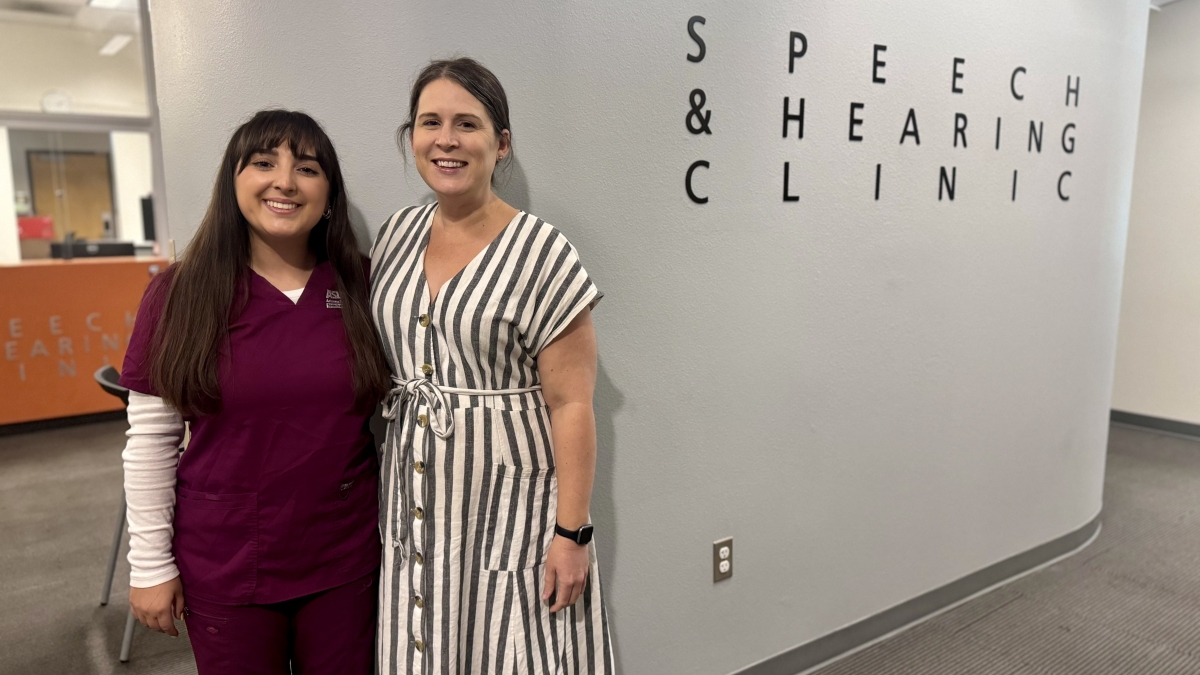College of Health Solutions program helps Parkinson’s patients ‘speak out’

From left: College of Health Solutions student Mikayla Szabo and Clinical Associate Professor Elizabeth Trueba pose in the Speech and Hearing Clinic at ASU.
Degenerative diseases are of an especially insidious nature in that they only get worse over time. One such disease, Parkinson’s, is known for a common manifestation called hypokinetic dysarthria, or a progressively softer voice.
At Arizona State University, those with Parkinson’s disease have been benefiting from vocal therapy to address hypokinetic dysarthria at no cost, thanks to a collaboration with the Parkinson Voice Project, a Texas nonprofit clinic that created a program called SPEAK OUT!
The program teaches those with hypokinetic dysarthria to express themselves again vocally and to speak with intent.
“Unfortunately, because of our health care system, sometimes people can't get speech therapy because they don’t have insurance, or their insurance doesn't cover it,” said Elizabeth Trueba, clinical associate professor at ASU’s College of Health Solutions, which hosts the SPEAK OUT! therapy program.
Enroll now
The program is now enrolling for the fall 2024 semester. Those interested in SPEAK OUT! therapy or who know someone who has been diagnosed with Parkinson’s can request a free appointment with ASU to learn more. Services are also provided in Spanish.
The program can be attended in person or virtually through Zoom, and a massive catalog of virtual daily therapy exercises are available 24/7 on the Parkinson Voice Project website.
ASU is home to the only SPEAK OUT! Therapy and Research Center in the state of Arizona.
At the start of every semester, people with Parkinson’s, and master’s degree students studying communication disorders, enroll in the four-to-eight-week SPEAK OUT! therapy course. Once that course is completed, individuals attend a group session, moderated by the students, along with past participants who have completed the course. The past participants help encourage the current participants in the group sessions.
“The SPEAK OUT! program is a unique opportunity for us to train students in areas that they may not have the opportunity to see in their internship rotations, while also allowing us to provide free services in a community that could really use the help,” said Tracey Schnick, assistant director of clinical services for the College of Health Solutions.
College of Health Solutions student Mikalya Szabo enrolled in the course in January. Her job was to help participants and moderate group sessions. She says that the group sessions were both fun and a great way to support those with Parkinson’s.
“We tell you this program will help you get your voice back, and it does,” Szabo said. “You see the growth almost instantly, because it's the way that the program is set up and the way that the disorder is functioning. You just have a very clear way of seeing that growth and seeing that change.”
Students enrolled in the program are provided a comprehensive training course, courtesy of the Parkinson Voice Project.
“This type of opportunity is a great fit for our program because it allows us not only to give back to the community we live in, but it also builds a sense of community embeddedness within our students, who will hopefully take that with them throughout their careers as speech-language pathologists,” Schnick said.
For Szabo, the experience was also personal.
“My grandpa had Parkinson's, so it was cool to see the speech therapy side of that, and it was really fun. I really enjoyed it,” she said.
Being a speech-language pathologist for communication disorders, Trueba loves helping people get their voice back and have a better quality of life.
“I love working with adults because they want to be here,” said Trueba, who is also a College of Health Solutions alumna. “When you lose communication and cognition due to a neurological event or disease, it can be very scary for you and your loved ones. These individuals are important members of their professions, families and communities. They come from all different backgrounds.
“When they come to our clinic, they are very motivated to regain and retain their skills.”
More Health and medicine

ASU, University of Wisconsin partner to empower Black people to quit smoking
Arizona State University faculty at the College of Health Solutions are teaming up with the University of Wisconsin to determine which treatments work best to empower Black people to quit…

New book highlights physician wellness, burnout solutions
Health care professionals dedicate their lives to helping others, but the personal toll of their work often remains hidden.A new book, "Physician Wellness and Resilience: Narrative Prompts to Address…

80 years of pioneering speech and hearing services for the community
Over 80 years ago, in 1937, the first course in communication disorders, Speech Correction, was offered at Arizona State University. As additional courses were added and programs in speech…